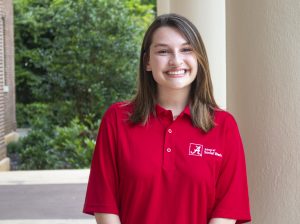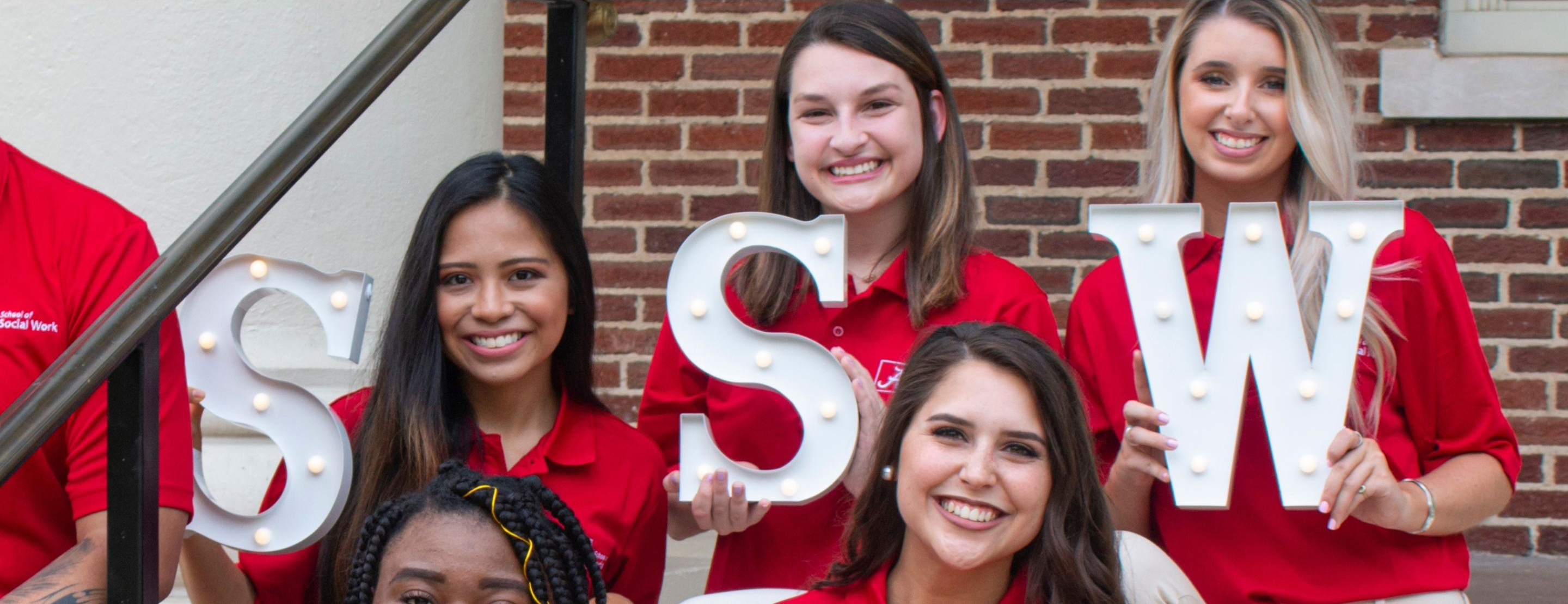Senior Finding New Motivations, Continuing Familiar Pitch for SSW This Semester
Sept. 27, 2020
By David Miller

Emily Dykes, senior BSW Ambassador.
It’s not unusual for a student to be redirected to social work once they get to campus and have negative experiences in another major. Some spend years working in a different field before realizing how a MSW degree can advance their career.
For those who decide to pursue a BSW before they get to campus, their factors for choosing social work as a major are typically rooted in relationships or life experiences.
For Emily Dykes, her servant’s spirit powered an ambition to be a pediatrician, but the math and science demands were daunting. She sought counsel in her teachers at the Tuscaloosa Career and Technology Academy, where, as a high school student, she was enrolled in a health science program.
“Up to that point, no one had ever told me about the other aspects of helping people,” Dykes said. “But part of choosing social work was also how I was brought up. My mom should have been a social worker; she worked in non-profits, and watching her do that made me want to help people as well.”
Dykes, in her senior year of a BSW and public health double-major, plans to pursue graduate school and eventually work in international social work, preferably with the United Nations or World Health Organization.
“Both would be really cool and fulfilling,” she said.
But, there’s much to accomplish before she embarks on her career. While many of Dykes’ public health and social work classes have overlapped for each program, her senior course-load is more intense, and she’s required to do another internship.
Additionally, Dykes is fulfilling her duties as a BSW Ambassador for the School of Social Work, a role she’s proudly served at the School for two years, and one she’s held informally.
“I love talking to people about social work,” Dykes said, “and it was already something I was doing with my friends. A lot of them were in psychology and debating on what they wanted to do, so I’d talk with them about it and present the options we have in the field.”
Fulfilling ambassador duties have taken a different shape this year, as the university and the School of Social Work adjust logistics for campus tours and orientation, which is “a bit sad,” Dykes said.
“I’m hopeful for Zoom meetings and social media,” Dykes said, “so we’ll still get to see people’s faces. That’s motivating me.”
Dykes has already experienced international social work and global health after completing a field placement with Healthwatch England in West London in fall 2019. At HealthWatch, Dykes would travel to various hospitals and general practices to survey patients on the various aspects of the healthcare they’d received. Those results would be compiled into a larger database.
Dykes’ internship revealed stark differences between healthcare infrastructure in England and the United States. For instance, healthcare is free for all citizens in England.
“That was a big plus,” Dykes said. “But the biggest difference was that most of the hospitals I went to had so many patients – one had 13,000. I’d never heard of so many patients at one hospital.
“Also, in America, we have different floors for different types of patients or surgeries. But, in England, people would go to one hospital for an issue, then have to leave to get it addressed at another hospital on the other side of the city.”
Preparation for an international field placement was a “lengthy process” that started with Dykes’ sophomore year, when she began exploring the process with Dr. Debra Nelson-Gardell, coordinator of international initiatives for the School. Then, in summer 2019, prior to her internship that fall, she enrolled in what she’d later call her “favorite” class: social work practice with communities, taught by Dr. Tania Alameda-Lawson.
“That broadened my horizons on a lot of things,” Dykes said. “[Alameda-Lawson] is a hands-on person, and there are a lot of group projects in the class. We did a lot of windshield surveys to understand the poverty in [Tuscaloosa], which a lot of people don’t know about. And we created a program that, hypothetically, could be implemented to help address it.
“Her class helped me in my internship to be more open to talking to people.”
